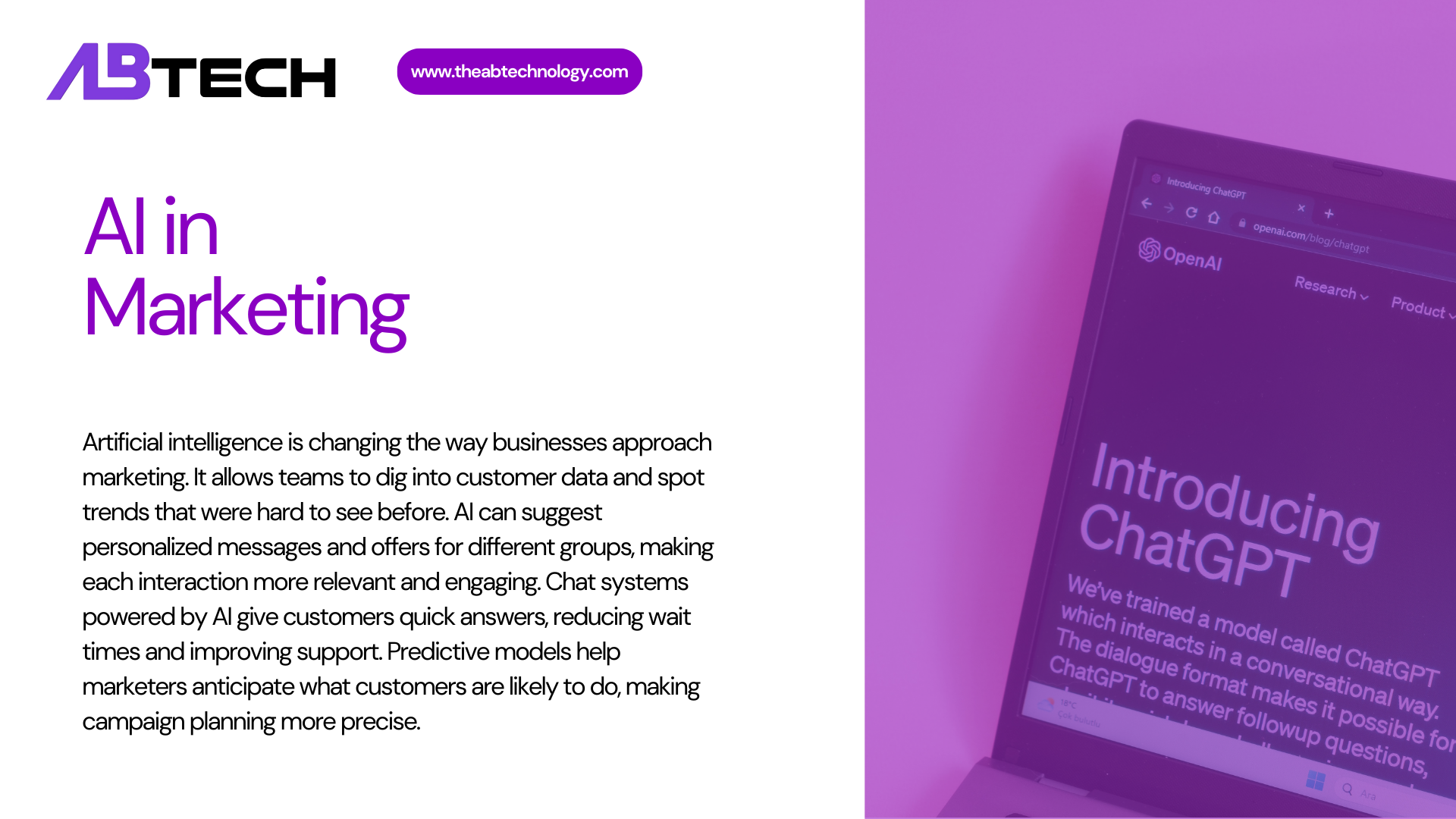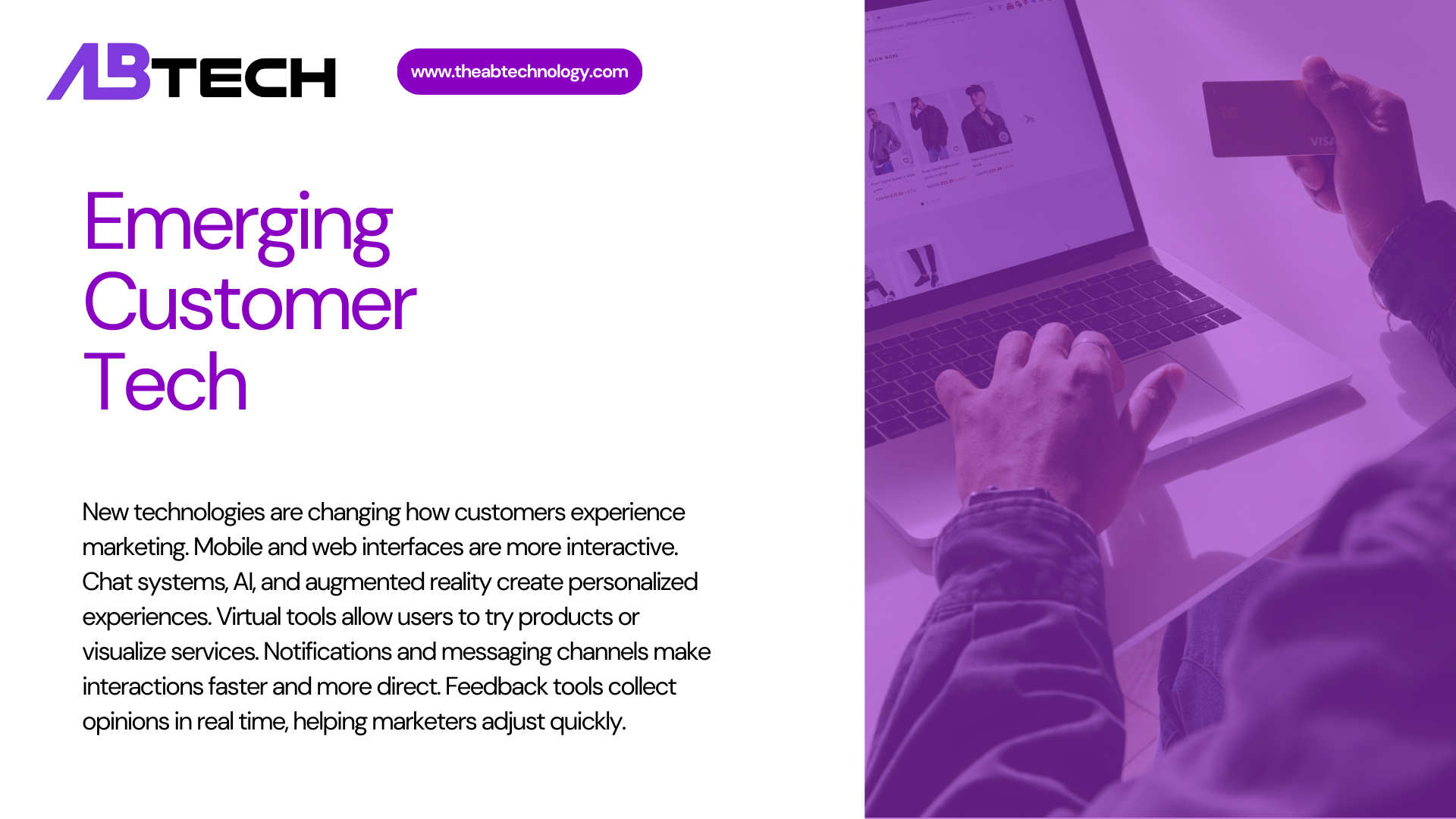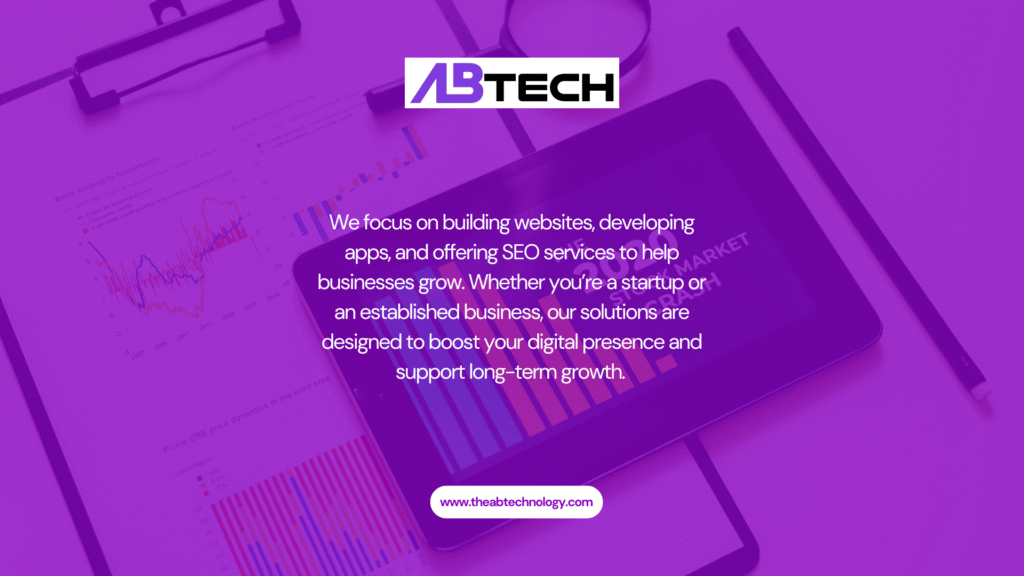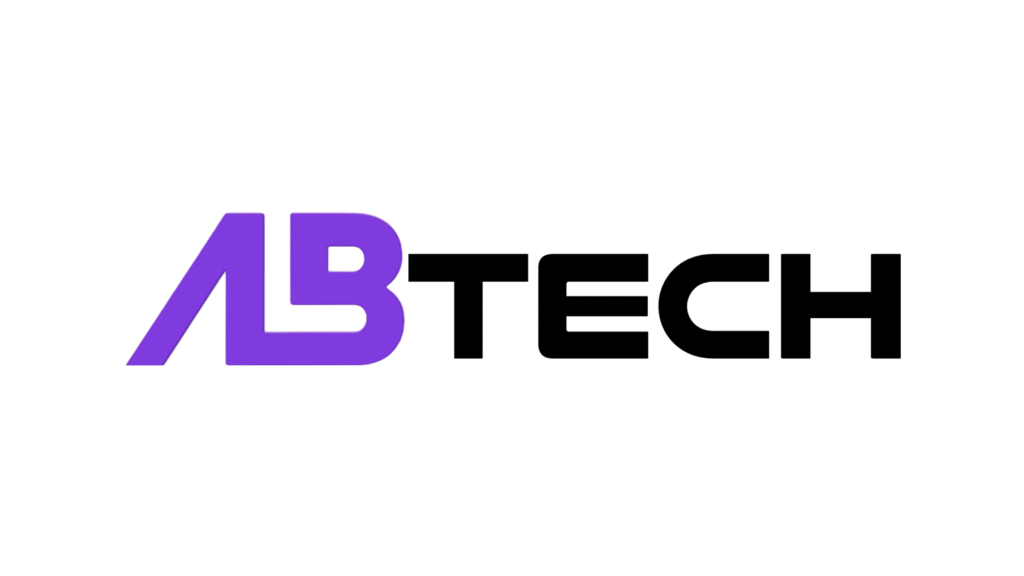
Technology Trends in Marketing for the Future of Business
Marketing technology trends are always changing as businesses look for better ways to reach their customers. Companies explore tools and strategies that help them understand audiences, improve engagement, and track results more accurately. These trends shape campaigns, influence budgets, and guide decisions across marketing teams. Staying aware of changes helps marketers stay competitive while providing better experiences for customers. From artificial intelligence tools to automation systems, there are many directions for marketers to explore. Digital campaigns depend on data and analytics, giving teams insight into what works and what needs adjustment.
Customer preferences change quickly, so marketing technology adapts to meet new expectations. Teams test different platforms to reach audiences more effectively. Approaches in personalization, content delivery, and performance tracking are becoming widely used. Many companies blend multiple marketing channels to keep messaging consistent. Understanding how these trends affect strategy helps with planning future campaigns. Tools for social media, email marketing, and website performance continue to evolve. Combining new methods helps brands stay relevant and visible. Professionals watch trends closely to make better decisions about resources. Overall, marketing technology trends affect both strategy and daily operations, shaping how businesses communicate with their audiences.
AI in Marketing

Artificial intelligence is changing the way businesses approach marketing. It allows teams to dig into customer data and spot trends that were hard to see before. AI can suggest personalized messages and offers for different groups, making each interaction more relevant and engaging. Chat systems powered by AI give customers quick answers, reducing wait times and improving support. Predictive models help marketers anticipate what customers are likely to do, making campaign planning more precise. Over time, AI learns from previous results and can fine-tune strategies to get better outcomes. Many companies are using AI to improve email campaigns, online ads, and website content, helping them connect with audiences more effectively. As these tools become more common, marketing teams are finding new ways to plan, manage, and deliver campaigns.
Smarter Campaigns
AI enables marketing campaigns to adjust automatically based on customer behavior. Teams can test multiple messages at once and see which ones perform better. Personalization is enhanced because AI tracks customer preferences and past interactions. Campaigns become more relevant when content aligns with individual needs. Automation allows marketers to focus on strategy while AI handles operational work. Over time, the system can suggest improvements to creative elements and timing. This continuous learning helps campaigns perform better without constant manual adjustments.
Predictive Analytics
AI helps forecast future trends in customer behavior by analyzing past interactions. Predictive models can estimate which products or services a customer might be interested in next. These insights give marketers a better idea of how to plan campaigns and respond to demand. By spotting patterns in the data, teams can focus their time and resources where they will have the most impact. Predictions powered by AI also make marketing messages more timely and relevant to each customer. Teams can adjust offers and messaging based on predicted outcomes. This makes campaigns more efficient and increases the likelihood of engagement.
AI Technology Impact
Artificial intelligence is having a significant impact on how marketing teams operate and make decisions. It helps businesses analyze large datasets quickly to identify trends and customer preferences. AI improves personalization, allowing brands to tailor content, offers, and experiences to individual users. It can streamline internal processes by handling repetitive tasks, freeing teams to focus on strategy and creativity. The technology also improves campaign performance through predictive modeling and real-time optimization. Businesses are leveraging AI to understand customer journeys more clearly and anticipate future behaviors. Decision-making becomes more data-driven, allowing marketers to prioritize efforts with better confidence. AI tools are increasingly integrated into analytics, communication, and content creation platforms. This impact is felt across industries, helping companies deliver more relevant and timely experiences. Overall, AI technology reshapes both strategy and execution in marketing.
Customer Personalization
AI makes it possible to deliver marketing that feels highly personalized by examining customer behavior and preferences. Brands can create content and offers that match what each person is most interested in. Recommendations become more accurate, which helps boost engagement and conversions. Campaigns adjust automatically as AI learns from how people interact with messages. This kind of personalization makes customers feel understood and increases the chances that they will respond positively. Personalized marketing also encourages loyalty and repeat interactions. Over time, AI can refine its recommendations to make campaigns even more relevant.
Operational Efficiency
AI automates repetitive tasks such as segmentation, reporting, and data entry. Teams save time and focus on creative or strategic initiatives. Campaign monitoring is faster and more accurate with AI insights. Human errors are reduced as routine processes are handled automatically. Operational efficiency improves productivity across marketing departments. AI also helps teams quickly adapt campaigns based on performance data. This allows businesses to maintain momentum without overloading staff.
Predictive Decision-Making
AI uses historical data to forecast trends and customer actions. Marketing teams can plan campaigns more effectively with predictive insights. It helps allocate resources to initiatives with the highest potential impact. Predictive decision-making reduces guesswork and improves ROI. Companies can anticipate customer needs and respond proactively.
Marketing Automation Tools
Marketing automation tools help businesses manage repetitive tasks without needing constant manual effort. They can schedule emails, social media posts, and promotions reliably. Analytics show which campaigns are performing well and highlight areas that might need changes. Automation also organizes customer data, making it easier to understand behavior and target the right audience. With routine tasks taken care of, teams can spend more time on creative work and strategy. These tools also help keep messaging consistent across different channels, making campaigns smoother and more coordinated.
Workflow Efficiency
Automation streamlines marketing processes and reduces manual errors. Teams can schedule emails, posts, and notifications automatically. Lead nurturing sequences are delivered consistently without human intervention. Campaign consistency improves brand recognition and trust. By automating routine tasks, marketers gain more time to focus on strategy and creativity. Automation also ensures that updates and adjustments are applied quickly across all channels. This helps teams maintain smooth operations even during high-volume campaigns.
Targeted Outreach
Automation allows for precise segmentation of audiences. Customers receive content that is relevant to their preferences and actions. Follow-ups happen automatically based on user behavior, increasing the likelihood of conversion. Marketing teams can deliver messages at the optimal time for engagement. This results in a more personalized experience that strengthens customer relationships. Automated insights also help refine audience segments over time. Teams can adjust campaigns dynamically based on how different groups respond.
Emerging Customer Tech

New technologies are changing how customers experience marketing. Mobile and web interfaces are more interactive. Chat systems, AI, and augmented reality create personalized experiences. Virtual tools allow users to try products or visualize services. Notifications and messaging channels make interactions faster and more direct. Feedback tools collect opinions in real time, helping marketers adjust quickly. Personalization extends to product recommendations, content, and pricing.
Interactive Interfaces
Interactive tools engage users actively rather than passively. Mobile and web interfaces allow customization and control. Customers can navigate content at their own pace. Feedback mechanisms enhance communication and responsiveness. These tools make experiences more engaging and satisfying. Interactive features also encourage users to spend more time exploring products or services. Marketers can use this engagement data to refine future campaigns.
Virtual Experiences
Augmented and virtual reality create immersive experiences for customers. Users can visualize products in their own environment. Virtual tools reduce uncertainty and increase confidence in purchases. These technologies allow experimentation without physical trials. Businesses can highlight features and benefits more effectively through AR and VR. Virtual experiences also make interactions more memorable for customers. This can increase brand loyalty and the likelihood of repeat engagement.
Marketing Tech Stack
Marketing technology stacks combine multiple tools to support campaigns. Platforms for analytics, email, social media, and advertising often work together. Integration ensures consistent messaging and smooth workflows. Teams use dashboards to monitor performance across all channels. Metrics and KPIs help evaluate the impact of each tool. Stacks help teams react quickly to market changes and opportunities. A well-organized stack reduces errors and improves collaboration.
Tool Integration
Connected tools reduce manual work and streamline operations. Analytics dashboards consolidate data for clear visibility. Integration allows teams to respond quickly to market changes. Campaigns across channels remain consistent and coordinated. Teams benefit from faster reporting and simplified workflows. Integration also helps prevent errors and miscommunication between different platforms. Marketers can make adjustments in one system that are reflected across the entire stack.
Performance Metrics
Monitoring metrics and KPIs measures the impact of marketing tools. Teams can identify which tools deliver the best results. Data-driven decisions help optimize campaigns. Consistent tracking highlights trends over time. Metrics provide insights that guide future strategy and investment. Performance analysis can reveal gaps or opportunities in campaigns. This allows teams to make continuous improvements and maximize outcomes.
Future Marketing Trends
Marketing technology keeps changing, and new tools continue to shape how teams plan and run campaigns. AI, automation, and analytics will remain central to decision-making. Customers are expecting more personalized and faster experiences than ever. Emerging tools like augmented reality, voice interfaces, and interactive content will open up new ways to engage audiences. Marketing strategies will need to adjust as platforms and communication channels evolve. Teams across departments will work more closely to ensure a consistent experience. Mobile and multi-device interactions will continue to play a major role in reaching customers effectively.
Predictive Insights
Analytics and AI provide insights to forecast customer behavior. Teams can anticipate trends and plan campaigns effectively. Predictive insights help allocate resources to initiatives with the highest potential impact. Decision-making becomes more data-driven and accurate. Marketing strategies can adjust proactively rather than reactively. Predictions also allow teams to respond to unexpected changes in customer behavior. This helps maintain relevance and effectiveness across campaigns.
Adaptable Strategies
Marketing plans must remain flexible as trends change. Teams adjust content, channels, and campaigns according to new insights. Continuous evaluation improves relevance and effectiveness. Adaptable strategies help brands maintain a competitive edge. Planning for flexibility ensures long-term campaign success. Flexibility also allows marketers to experiment with new tools and approaches. This approach reduces risk and supports more innovative campaigns.

